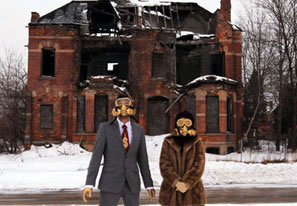
In November, federal judge Steven Rhodes approved Detroit’s reorganization plan, paving the way for the city’s exit from bankruptcy. The process of rebuilding the Motor City physically and economically can now begin. Attracting the investment necessary to do this, however, might be a challenge. Detroiters tend to view outsiders as little more than carpetbaggers.
Consider Shinola, a luxury-goods start-up that employs more than 250 people in Detroit, many engaged in the manufacturing of bicycles, leather goods, and watches. The firm has opened boutiques in New York and London and is running multipage ads in upscale magazines, boasting of its Detroit connection. But not everybody sees Shinola as a Detroit success story. “Shinola is using my city as its shill, pushing a manufactured, outdated and unrealistic ideal of America,” wrote Detroit native John Moy on Four Pins, a fashion website. He complains about Shinola’s out-of-town financial backers and its use of parts made elsewhere. When Shinola installed four outdoor city clocks, someone tagged them with graffiti.
Shinola is not alone. In 2009, suburban businessman John Hantz proposed turning vacant Detroit parcels into a productive commercial farming operation. After years of effort and investment, he finally got permission to build a hardwood-tree farm on 15 noncontiguous acres. At his own expense, Hantz beautified his property and started planting high-quality, mature trees. “It took me five years and $1 million to get the right to mow the lawns that hadn’t been mowed in 15 years,” he told Crain’s Detroit Business. While bureaucratic bungling played a key role in the delays, his operation also had to face down critics who derided it as a “land grab.”
The 2012 documentary Detropia struck a similar chord, portraying the artists who’ve flocked to the city as parasites. Several scenes of two artists in gold gas masks, heavily used in the film’s promotional materials, make the entrepreneurial bohemians seem like invaders from outer space. Filmmaker Heidi Ewing said that when she hears people describe Detroit as a “blank slate,” it “pisses her off.”
What these and other incidents reveal is an “it’s our city” mind-set among locals deeply hostile to and suspicious of outsiders—and of outside investment. “Detroit is the only town in America where misery hates company, or at least distrusts it,” wrote Detroit Free Press columnist Brian Dickerson about the Shinola controversy. Detroiters, he notes, view enterprising newcomers as “mere poseurs, parasites feeding off a hardscrabble heritage to which they lack any legitimate claim.”
Some of this is understandable. In a recent study of urban rootedness, Governing magazine found that Detroit had more longtime residents than any other large city surveyed. Those residents who stayed during the decline resent outsiders coming in now and leveraging the city’s ruination for profit. The city’s overwhelmingly black population lends an unavoidable racial dimension to this critique. It’s a short step from there to conspiracy theories claiming that Detroit was deliberately destroyed so that whites could reclaim it on the cheap.
Repairing the city’s balance sheet through bankruptcy was a vital first step. Going forward, though, Detroit’s recovery will depend on restoring basic city services without killing off the economic and artistic vibrancy created by the governmental vacuum of the last few years. Detroit must also convince outside investors that they can turn a profit in the city. New stakeholders will have their own ideas about what the city should become. They won’t simply mail checks.
Detroiters’ suspicion about outside money isn’t unique. New Yorkers have been known to look askance at foreign billionaires buying up high-end real estate in the Big Apple. But Detroit’s insularity has been particularly destructive; the city’s lack of economic diversity, after all, contributed mightily to its decline. Unless the Motor City makes peace with outside investors, don’t expect a real recovery anytime soon.
